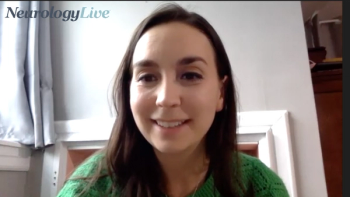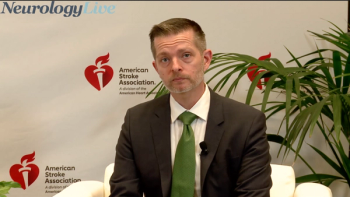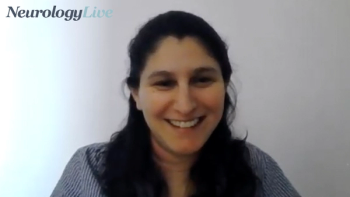
After showing inconsistent results in previous trials, AVP-786 did not demonstrate statistically significant outcomes vs placebo on the primary outcome of change in Cohen-Mansfield Agitation Inventory.

After showing inconsistent results in previous trials, AVP-786 did not demonstrate statistically significant outcomes vs placebo on the primary outcome of change in Cohen-Mansfield Agitation Inventory.

The postdoctoral research fellow at Brigham and Women’s Hospital and Harvard Medical School discussed some of the issues with ensuring timely care access to approved therapies for patients with Duchenne muscular dystrophy. [WATCH TIME: 3 minutes]

TAK-861, an orexin receptor 2 agonist, demonstrated efficacy and safety in a phase 2b trial for narcolepsy type 1.

The epileptologist at NYU Langone Health and associate professor of neurology at NYU Grossman School of Medicine talked about the ongoing need to improve public awareness and education on seizure first aid. [WATCH TIME: 3 minutes]

Topline results from the RESCUE trial indicate that RNS60, an anti-inflammatory agent, demonstrates safety and potential efficacy in acute ischemic stroke.

New findings from the TIMELESS trial suggest that tenecteplase within 4.5 to 24 hours post-stroke might benefit certain subgroups, despite overall neutral outcomes.

The assistant professor of neurosurgery and biomedical informatics at the State University of New York at Buffalo provided commentary on the significant findings from the EMBOLISE trial presented at the 2024 International Stroke Conference. [WATCH TIME: 4 minutes]

Using a cohort of more than 20,000 patients with ischemic stroke, those on AI-CDSS experienced less vascular events of hemorrhagic stroke, myocardial infarction, or vascular death.

Ahead of the 2024 MDA Conference, the medical advisor and care center director at Muscular Dystrophy Association talked about the track sessions he will be cochairing at the meeting. [WATCH TIME: 5 minutes]

Here's some of what is coming soon to NeurologyLive® this week.

A recent study highlighted the elevated risk of liver diseases, particularly hepatic encephalopathy, in veterans with dementia who lacked a cirrhosis diagnosis.

The staff neurologist and medical director of the Barlo Multiple Sclerosis Program at St Michaels Hospital shared thoughts on the promising advancements in the multiple sclerosis field for 2024. [WATCH TIME: 5 minutes]

Test your neurology knowledge with NeurologyLive®'s weekly quiz series, featuring questions on a variety of clinical and historical neurology topics. This week's topic is neuromuscular disorders, and specifically, Duchenne muscular dystrophy.

Tirofiban treatment in acute ischemic stroke reduced early neurological deterioration compared to oral antiplatelet therapy alone, warranting further investigation.

Elezanumab's biomarker analysis in stroke patients underscores its potential as a neuroprotective therapy for acute ischemic stroke management.

Take 5 minutes to catch up on NeurologyLive®'s highlights from the week ending February 9, 2024.

The research scientist at Kessler Foundation discussed a recently funded study focused on improving memory and learning deficits in patients with multiple sclerosis by combining a cognitive rehabilitation program with a cycling initiative enriched with virtual reality elements. [WATCH TIME: 7 minutes]

Over a 90-day period, investigators observed significantly lower functional outcomes on modified Rankin Scale and similar rates of bleeding and death when compared with control.

Mind Moments®, a podcast from NeurologyLive®, brings you an interview with Ignacio Mata, PhD. [LISTEN TIME: 21 minutes]

IPX203, a novel, oral formulation of carbidopa/levodopa, had its new drug application supported by findings from the phase 3 RISE-PD study, where treated patients showed greater ON time than immediate-release CD/LD.

The professor of neurology at the Zucker School of Medicine at Hofstra-Northwell talked about recently updated epilepsy care guidelines that shift the focus to outpatient care, incorporating broader aspects like care coordination, medication access, and patient-identified needs. [WATCH TIME: 5 minutes]

Nananda Col, MD, MPH, MPP, FACP, the president and founder of Shared Decision Making Resources, spoke about usage of the MS-SUPPORT tool in a recent study to foster shared decision-making between patients and clinicians in multiple sclerosis.

The associate professor of neurology at Weill Cornell Medicine talked about a recent study that revealed that minimally invasive surgery significantly reduced the risk of mortality in patients with nontraumatic intracerebral hemorrhage. [WATCH TIME: 4 minutes]

Over a 6-month period, yoga was shown to be efficacious in managing neuropsychiatric comorbidities in epilepsy, along with reducing overall seizure frequency.

A recent study delved into the epilepsy and developmental patterns of STXBP1-related disorders, showing distinct trajectories and treatment insights for this common genetic epilepsy disorder.

The chief of the division of stroke and hospital neurology at Weill Cornell Medicine shared some of his thoughts on the promising clinical trials being presented at the 2024 International Stroke Conference. [WATCH TIME: 3 minutes]

In comparison with placebo, slightly better outcomes on modified Rankin Scale were observed with adrenomedullin.

The postdoctoral research fellow at Brigham and Women’s Hospital and Harvard Medical School provided answers to a recently published study highlighting the burden of care and infrequent use of novel exon-skipping drugs for Duchenne in clinical settings. [WATCH TIME: 3 minutes]

The chief executive officer of ClearPoint Neuro provided clarity on how the recently approved SmartFrame system can enhance the efficiency of operating room procedures, allowing for flexible workflows and image-based corrections.

Encoded Therapeutics plans to initiate clinical trials assessing its gene therapy candidate ETX101 for the treatment of SCN1A+ Dravet syndrome during the first half of 2024.